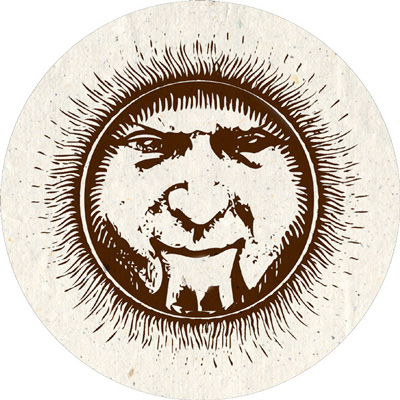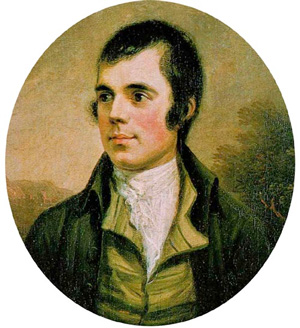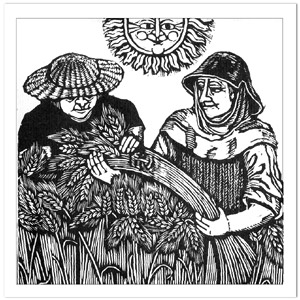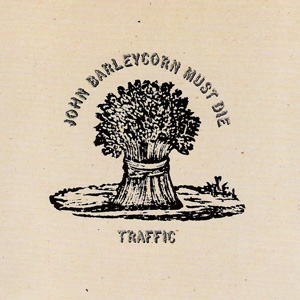![]()
John Barleycorn is an old English folksong that originated in the 16th century. It was a popular tale, though is remains somewhat disturbing, even today. Primarily an allegorical story of death, resurrection and drinking, the main character—the eponymous John Barleycorn—is the personification of barley who is attacked and made to suffer indignities and eventually death. These correspond roughly to the stages of barley growing and cultivation, like reaping and malting. Some scholars see the story as pagan, representing the ideology of the cycles of nature, spirits and the pagan harvest, and possibly even human sacrifice. After John Barleycorn’s death, he is resurrected as beer, bread and whisky. Some have also compared it to the Christian transubstantiation, since his body is eaten as bread and drank as beer.
There are many, many different versions of the story, which began appearing at least as early as 1568. While they differ slightly, the substance of the song has remained largely the same. The Scottish poet Robert Burns published his own take on the story in 1782.
Here, below, are several different versions of the song:
There was three men came out of the west,
Their fortunes for to try,
And these three men made a solemn vow,
John Barleycorn should die.
They ploughed, they sowed, they harrowed him in,
Throwed clods upon his head,
And these three man made a solemn vow,
John Barleycorn was dead.Then they let him lie for a very long time
Till the rain from heaven did fall,
Then little Sir John sprung up his head,
And soon amazed them all.
They let him stand till midsummer
Till he looked both pale and wan,
And little Sir John he growed a long, long beard
And so became a man.They hired men with the scythes so sharp
To cut him off at the knee,
They rolled him and tied him by the waist,
And served him most barbarously.
They hired men with the sharp pitchforks
Who pricked him to the heart,
And the loader he served him worse than that,
For he bound him to the cart.They wheeled him round and round the field
Till they came unto a barn,
And there they made a solemn mow of poor John Barleycorn.
They hired men with the crab-tree sticks
To cut him skin from bone,
And the miller he served him worse than that,
For he ground him between two stones.Here’s little Sir John in a nut-brown bowl,
And brandy in a glass;
And little Sir John in the nut-brown bowl
Proved the stronger man at last.
And the huntsman he can’t hunt the fox,
Nor so loudly blow his horn,
And the tinker he can’t mend kettles nor pots
Without a little of Barleycorn.
This version also included the following explanatory text, taken from The Penguin Book of English Folk Songs:
John Barleycorn appeared in the Journal of Folk Song Society Volume VIII, 41. It was printed in the reign of James I but is said to be much older. There were several 17th century broadsides of the song. It was well-known throughout England. Variants from Sussex, Hampshire, Surrey, Somerset and Wiltshire were published in the Journal of Folk Song Society.

And this one is taken from “Early Ballads Illustrative of History, Traditions, and Customs: Also, Ballads and Songs of the Peasantry of England, Taken Down from Oral Recitation and Transcribed from Private Manuscripts, Rare Broadsides, and Scarce Publications” by Robert Bell, and published by G. Bell & sons in 1885.
There came three men out of the West,
Their victory to try;
And they have taken a solemn oath,
Poor Barleycorn should die.They took a plough and ploughed him in,
And harrowed clods on his head;
And then they took a solemn oath,
Poor Barleycorn was dead.There he lay sleeping in the ground,
Till rain from the sky did fall :
Then Barleycorn sprung up his head,
And so amazed them all.There he remained till Midsummer,
And looked both pale and wan;
Then Barleycorn he got a beard,
And so became a man.Then they sent men with scythes so sharp,
To cut him off at knee ;
And then poor little Barleycorn,
They served him barbarously.Then they sent men with pitchforks strong
To pierce him through the heart;
And like a dreadful tragedy,
They bound him to a cart.And then they brought him to a barn,
A prisoner to endure;
And so they fetched him out again,
And laid him on the floor.Then they set men with holly clubs,
To beat the flesh from his bones ;
But the miller he served him worse than that,
For he ground him betwixt two stones.O ! Barleycorn is the choicest grain
That ever was sown on land ;
It will do more than any grain,
By the turning of your hand.It will make a boy into a man,
And a man into an ass;
It will change your gold into silver,
And your silver into brass.It will make the huntsman hunt the fox,
That never wound his horn;
It will bring the tinker to the stocks,
That people may him scorn.It will put sack into a glass,
And claret in the can;
And it will cause a man to drink
Till he neither can go nor stand.
The 1885 rendition also includes this commentary:
The West-country ballad of Sir John Barleycorn is very ancient, and being the only version that has ever been sung at English merry-makings and country feasts, can certainly set up a better claim to antiquity than any of the three ballads on the same subject to be found in Evans’s collection ; viz., John Barleycorn, The Little Barleycorn, and Mas Maulf. Our west-country version bears the greatest resemblance to The Little Barleycorn, but it is very dissimilar to any of the three. Burns altered the old ditty, but on referring to his version it will be seen that his corrections and additions want the simplicity of the original, and certainly cannot be considered improvements. The common ballad does not appear to have been inserted in any of our popular collections. Sir John Barleycorn is very appropriately sung to the tune of Stingo.

This is the 1782 version by the Scottish poet Robert Burns, which is referred to above.
There was three kings into the east,
Three kings both great and high,
And they hae sworn a solemn oath
John Barleycorn should die.They took a plough and plough’d him down,
Put clods upon his head,
And they hae sworn a solemn oath
John Barleycorn was dead.But the cheerful Spring came kindly on,
And show’rs began to fall;
John Barleycorn got up again,
And sore surpris’d them all.The sultry suns of Summer came,
And he grew thick and strong;
His head weel arm’d wi’ pointed spears,
That no one should him wrong.The sober Autumn enter’d mild,
When he grew wan and pale;
His bending joints and drooping head
Show’d he began to fail.His colour sicken’d more and more,
He faded into age;
And then his enemies began
To show their deadly rage.They’ve taen a weapon, long and sharp,
And cut him by the knee;
Then tied him fast upon a cart,
Like a rogue for forgerie.They laid him down upon his back,
And cudgell’d him full sore;
They hung him up before the storm,
And turned him o’er and o’er.They filled up a darksome pit
With water to the brim;
They heaved in John Barleycorn,
There let him sink or swim.They laid him out upon the floor,
To work him farther woe;
And still, as signs of life appear’d,
They toss’d him to and fro.They wasted, o’er a scorching flame,
The marrow of his bones;
But a miller us’d him worst of all,
For he crush’d him between two stones.And they hae taen his very heart’s blood,
And drank it round and round;
And still the more and more they drank,
Their joy did more abound.John Barleycorn was a hero bold,
Of noble enterprise;
For if you do but taste his blood,
‘Twill make your courage rise.‘Twill make a man forget his woe;
‘Twill heighten all his joy;
‘Twill make the widow’s heart to sing,
Tho’ the tear were in her eye.Then let us toast John Barleycorn,
Each man a glass in hand;
And may his great posterity
Ne’er fail in old Scotland!

In the early 1980s, a Vermont artist, Mary Azarian, created a children’s book version of the song, using beautiful hand-crafted original woodcuts, such as the one above. She changed the lyrics slightly, presumably for her audience. She also altered the title a little, calling it “The Tale of John Barleycorn or From Barley To Beer.”
There were three men
Came Down from Kent
To plough for wheat
And ryeAnd these three men
Made a solemn vow
John Barleycorn
Should dieThen with a plough they ploughed him up
And thus they did devise
To bury him within the earth
And swore he would not riseWith harrows strong
They combed him
And burst clods upon
His headAnd a joyful banquet
Then was made
When Barleycorn
Was deadHe rested still
Within the earth
Till rain from heaven
Did fallThen he grew up
In branches green
Which so amazed
Them allThey let him stand
Till Midsummer
Then he grew both pale
And wanAnd Little Sir John
Grew with a long beard
And so became
A manWherefore with hooks and sickles sharp
Into the field they hied
To cut his legs off by the knees
And made his wounds fall wideThey hired men
With sharp pitchforks
Who pricked im to
The heartThe loader served
Him worse than that
For he bound him to
A cartThey wheeled him
Around the house
Till they came unto
A barnAnd there they made
A solemn mow
Of poor
John BarleycornThen next the thatcher
He comes in
With reeds and spars
So sharpHe covers over
John Barleycorn
And he must stand
The stormsThey hired two
With holly sticks
To beat on him
At onceThey thwacked so
On Barleycorn
That flesh fell from
His bonesThey carted him
To a flour mill
And there they burst
His bonesAnd the Miller swore
To murther him
Betwixt a pair
Of stonesThe huntsman he comes out one day
And loudly blows his horn
And all the folk did rejoice and sing
For the sake of BarleycornThey worked their will
On John Barleycorn
And he lived to tell
The taleAnd they pour him from
An earthen jug
And they call him
Homebrewed aleBarleycorn is the very best seed
That ever was sowed on land
For it would do the heart most good
In the turning of man’s hand

In 1970, Steve Winwood’s band Traffic released a modern version of the song on the album “John Barleycorn Must Die.” This is the version used by Traffic for their lyrics to the song:
There were three men came out of the west,
Their fortunes for to try.
And these three men made a solemn vow:
John Barleycorn must die.They’ve plowed, they’ve sown, they’ve harrowed him in,
Threw clods upon his head.
And these three men made a solemn vow:
John Barleycorn was dead.They’ve let him lie for a very long time,
Till the rains from heav’n did fall.
And little Sir John sprung up his head,
And so amazed them all.They’ve let him stand ’till midsummer’s day,
Till he looked both pale and wan.
And little Sir John’s grown a long, long beard,
And so become a man.They’ve hired men with scythes so sharp,
To cut him off at the knee.
They’ve rolled him and tied him by the waist,
Serving him most barb’rously.They’ve hired men with the sharp pitchforks,
Who pricked him to the heart.
And the loader, he has served him worse than that,
For he’s bound him to the cart.They’ve wheeled him ’round and around the field,
‘Till they came unto a barn,
And there they’ve made a solemn oath,
On poor John Barleycorn.They’ve hired men with the crabtree sticks,
To cut him skin from bone,
And the Miller, he has served him worse than that,
For he’s ground him between two stones.And little Sir John in the nut-brown bowl,
And the brandy in the glass.
And little Sir John in the nut-brown bowl,
Proved the strongest man at last.The Huntsman, he can’t hunt the fox,
Nor so loudly blow his horn,
And the Tinker, he can’t mend kettle nor pot,
Without a little Barleycorn.
And finally, here’s some very thoughtful analysis of the song, from Everything2:
The ballad of John Barleycorn has hundreds (one count put it at 140 – 200 — I’m only describing two (both of which are in the public domain)) of versions that are found going back to at least 1465 (from the James Ist Pepoysian collection as indicated by H Gorson (1607-1641). It is assumed that the story of John Barleycorn goes back even futrther. The most common poetic is that of Robert Burns (1759-1824).
There are questions about the origins of this poem. The Pengin Book of English Folk Songs says this about it:
This ballad is rather a mystery. Is it an unusually coherent folklore survival of the ancient myth of the slain and the resurrected Corn-God, or is it the creation of an antiquarian revivalist, which has passed into popular currency and become ‘folklorised’? It is in any case an old song, of which an elaborate form was printed in the reign of James I. It was widespread over the English and Scottish countryside, and Robert Burns rewrote a well-known version..
John Barleycorn refers not to a person but rather a god representing the field that is to be harvested, and in paticular barleycorn itself from which beer and mead are brewed.
The sung version (below) has been covered by Jethro Tull, Trafic, Steeleye Span, Steve Winwood, The Watersons, (and many other celtic folk groups) and has been sung at countless Renaissance festivals and SCA events.
Adam, Cain and Abel staggered
manfully across the field carrying a
plough, a harrow and a grain of
wheat… John Barleycorn–
mysterious intimations from above
told them to dig three deep furrows and
bury him — this done they returned
home and started to draw up plans for
the first ale house.This verse is not found in all versions, and may put names to the three men that are later mentioned. This puts this as ancesteral time and much along the lines of “once upon a time” or more aptly, “in the beginning”. This verse is spoken and not sung, singing begins at the second verse.
There was three men come out of the West
Their fortunes for to try
And these three men made a solemn vow
John Barleycorn must die.
They ploughed, they sowed, they harrowed him in
Throwing clods all on his head
And these three men made a solemn vow
John Barleycorn was Dead.The sun sets in the west and thus is the portion of the compass that represents death (the sun rises in the east and thus east is birth). The thing to realize here is that the ‘birth’ happens in the fall months and thus the men from the west who ‘kill’ John Barleycorn are also responsible for his birth. It is possible that these three men also represent the three months of the year of the fall – the season that kills the plants. An alternate version the first half for this verse is:
There were three men
Came from the west
Their fortunes for to tell,
And the life of John Barleycorn as well.The verse tells of people planting the grain in the ground and covering it with dirt.
They let him lie for a very long time
Till the rain from heaven did fall
Then little Sir John he raised up his head
And he soon amazed them all
They let him lie till the long midsummer
Till he looked both pale and wan
Then little Sir John growed a long long beard
And so become a manHere we have the spring and summer where at first the grain pops out of the ground after it rains – which amazes people. After midsummer the corn grows a beard which is actually refering to the tassels on grain. And so the grain matures.
They hired men with the scythes so sharp
To cut him off down by the knee
They rolled him and tied him round by the waist
Served him most barbarously
They hired men with the sharp pitchforks
Who pierced him to the heart
But the loader served he served him far worse than that
For he bound him to the cartAnd so it is harvest time where people with sharp scythes cut down the corn and then time it up. After being tied up the bales are tossed into a cart with a pitchfork.
They rode him round and around the field
Till they came into a barn
And there they made a solemn mow
Of poor John Barleycorn
They hired men with the crabtree sticks
Who cut him skin from bone
But the miller he has served him far worse than that
For he ground him between two stonesAnd the harvest continues where they took the corn to the barn and threshed it with crabtree sticks. In corn, rather than cutting skin from bone this removes the seeds from the rest of the plant. At which point the miller would take the corn and then ground it between two stones to make flour.
They’ve wheeled him here, they’ve wheeled him there,
They’ve wheeled him to a barn,
And they have served him worse than that,
They’ve bunged him in a vat.
They have worked their will on John Barleycorn
But he lived to tell the tale,
For they pour him out of an old brown jug
And they call him home brewed ale.At this point, we see the cycle of rebirth for John lived to tell the tale.
Here’s little Sir John in the nutbrown bowl
And brandy in a glass
And little Sir John in the nutbrown bowl
Proved the stronger man at last
For the hunter he can’t hunt the fox
Nor so loudly blow his horn
And the tinker he can’t mend his kettles or his pots
Without a little bit of John BarleycornAnd so after distilled you have some “Sir John in the nutbrown bowl” and brandy in the glass (from the wine). The very last part of this verse shows the parts of life that drink some – the hunter and the tinker.
There is some older pagen implications in this ballad too that describe the ritual breaking down of a person and building them up into a new (spiritual?) being. Furthermore, the four elements show up here with scythes being swords or daggers representing air (the suit of swords in Tarot is linked to the air). The crab-tree sticks are staves or wands and represent fire. The stones of the miller clearly refer to earth and the old brown jug is a cup which represents water. Some go further and link the vat to a cauldron and the womb.
In some traditions, a scarecrow like effegy was made and carried from field to field and then burnt which would release the spirit of John Barleycorn back into the field so that it may be reborn again the next spring.
